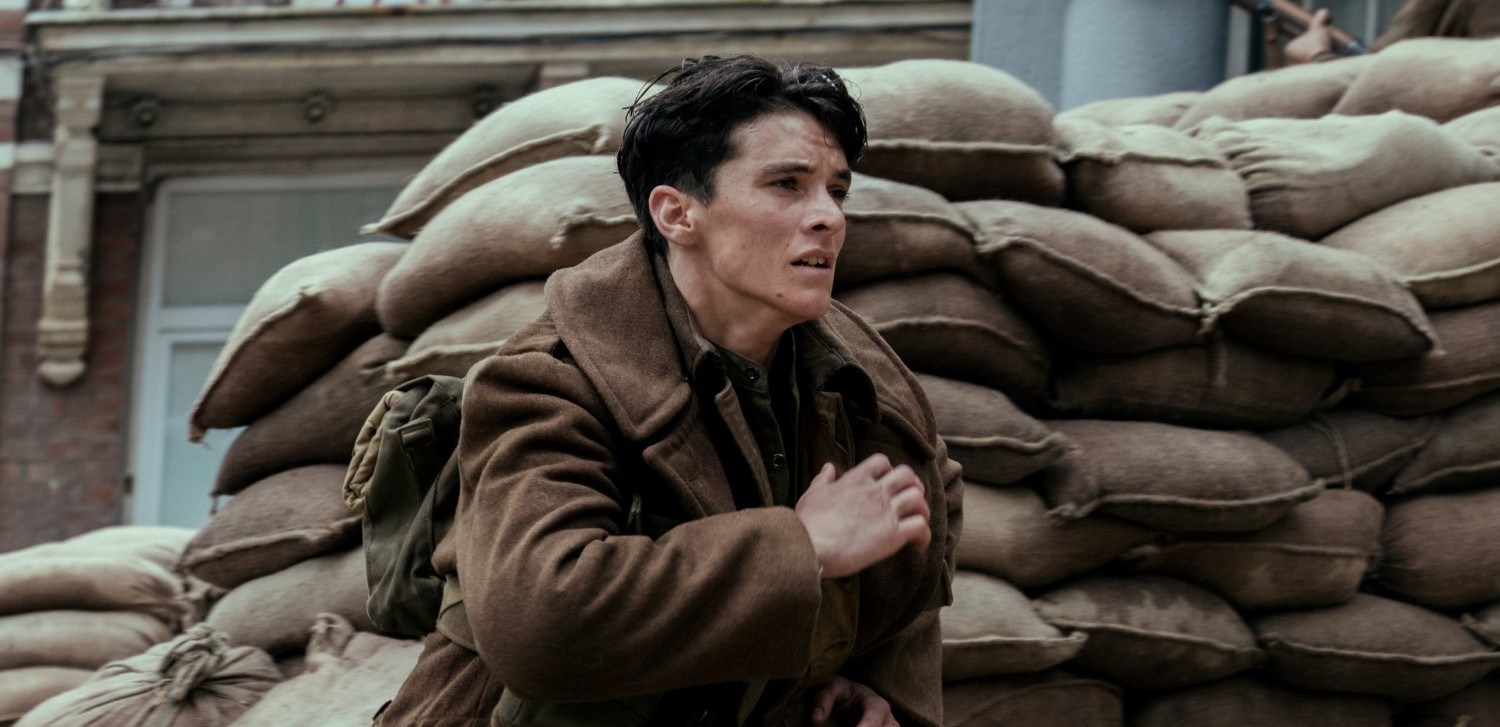There’s always been a relationship with time in the oeuvre of Christopher Nolan. Outside of his Batman films, there’s an ongoing push and pull within the narratives of his original projects in terms of the immutability of time and the effect it has in relation to his protagonists. From the reverse chronology and the unfolding of time via restored memory of Memento, to the time dilation of Inception, to the loss of time through outside forces within Interstellar, this has been the ongoing predilection of a great majority of Nolan’s career, both implicitly and otherwise. Within his hands, time can be a tool, a weapon, even an onrushing wave that sweeps up his characters into inherent tragedy (or in Interstellar’s case, eventual prosperity). With Dunkirk, he perhaps takes his most daring step yet: the use of time as the driver of the plot itself.
Dunkirk, as the trailers have surely indicated, tells the real-life story of the evacuation of British soldiers from the Battle of Dunkirk; a doomed conflict for the UK that in turned hastened fears about the eventual attack that was to come from Hitler’s Germany directly on their shores. This is a challenging subject for any filmmaker to capture. Nonetheless Nolan carries on, with not just one, but three different points of view taking place at different lengths of time. Over the course of a week, we lay witness to the plight of a young soldier (Fionn Whitehead) left waiting on the shores of Dunkirk with thousands of other young men, as they attempt to board rescue ships. The ships are all too few for the number of soldiers in need, and for the onrushing bombings they are consistently pelted with by the German army. In its second story, we spend one day with a father (Mark Rylance), his son, and his son’s friend as they take the brave step to aid the rescue effort, chartering their private boat into the warzone. Finally, a pilot (Tom Hardy) and his colleague traverse their fighter planes into Dunkirk over the course of an hour to secure clearer skies for those that are being saved.
These are three distinct stories, all serving to explore the scope of this conflict between infantrymen, airmen, and civilians; in some part, it’s as if Nolan has crammed together three incredibly tense survival novels and removed all of their nouns. There’s a reason that I didn’t outline any specific names in the above synopsis, and that’s because those aspects of the characters are barely touched on, if at all. Instead the film lets its individual trials, and the perseverance of its almost universally nameless heroes, act as its most absorbing elements. One of the best comparison points I can think of is the opening 15 minutes of Saving Private Ryan, still one of those most harrowing displays of war and its cost committed to celluloid. Now imagine that same tension, but continually piled on for over 110 minutes of running time. This was surely the most knuckle tightening cinematic experience released since Mad Max: Fury Road and Gravity, respectively.
But beyond just being a visceral experience, Dunkirk is an emotionally rendering one as well. Despite never knowing any of these young heroes intimately, Nolan makes an exceptional case for the shared experience, particularly one that relates to facing a dire situation, as a universal solvent for investment. Thanks to his unwavering third person approach to the travails these heroes face, we are given everything we need to hope for their best outcome. And by the end of the film, the emotional release is quite powerful. Nolan is often accused of being a cold, removed filmmaker, but the final 20 minutes of Dunkirk should quell those notions, or at least give way to the idea that he has more in his bag of tricks than some critics may have allowed.
Dunkirk’s most impressive feature, all due respect to its performances – which are wholly strong, though unmemorable, give or take Rylance – is the film’s construction itself. Despite the separation of time between its three POVs, the film cuts and weaves between all three, as if they are all taking place at the same time. There are even points at which these stories echo one another: for example, when one rescued soldier begins to drown, another in a downed plane is trying to escape a similar fate, or when a group of private ships arrive to the rescue, Rylance’s civilian captain is doing the same, only a few nautical miles away. The ongoing cross-cutting is brilliantly executed, and this is a film whose script and structure will be studied for years to come. This is where particular notice needs to be given to longtime Nolan collaborator, Lee Smith, whose editing here is a major contributing factor to the film’s success, along with Hans Zimmer, producing a score so in sync with the material on screen (its basis is an ongoing ticking clock) that it’s impossible to imagine Dunkirk without its aural component. Even the sound design, often a bit muddy in the director’s features, is immersive and aides in the effect of the audience member being right there with the film’s central figures.
With that said, Dunkirk does ask for a bit from its viewers. Unlike any other film he’s made, this is Nolan at his most sparse. There is very little to no exposition, and the hand-holding is held to a bare minimum. I see this as a great thing, given some of the lumpiness that his scripts are sometimes stricken with. It’s a fairly clear story, but it’s stripped down to the bone to the point where it almost feels like it could be a silent movie, which may turn off some. Additionally, outside of some of the older characters, there’s a bit of “face blindness” that may occur unless you’re keeping a close watch. Quite a few of these skinny, British men with brown hair can be difficult to tell apart, especially in the heat of a terse moment (Whitehead and Harry Styles excepted), but in a way that aides the film’s keen eye on the anonymity of war and the never ending supply of brave figures ready to stand up for their national pride at great cost.
With past features, Nolan has often found his work compared to that of other past masters. You can alternatively plug in directors like Scott, Mann, Malick, Kubrick, Lang, and Spielberg as touchstones here and there, but with Dunkirk, it’s the kind of movie that I think only a filmmaker with Nolan’s interests and ongoing obsessions could make. This is *his* movie, through and through. It’s the movie his entire career has been careening towards. It’s the best movie of his career, and easily the best cinematic experience of 2017 thus far.









I remember reading breathless reviews like this before seeing Interstellar and it might be one of the worst big budget movies I’ve seen. The sense of hyperbole is strong when it comes to Nolan, and he gets a lot of credit for he intends to do rather than what he actually executes.
I plan to see this, but I won’t comment if I don’t like it. Criticism of Nolan’s work regularly prompts death threats from fanboys who worship him.
Saw Sofia Coppola’s BEGUILED remake yesterday and like it, although (in my opinion) it’s not as good as the ’71 original with Clint Eastwood. That’s one to seek out on DVD or streaming, if you haven’t seen it.
David – For whatever it’s worth, I liked but didn’t love Interstellar. This is probably how I’d rank his films at this point, if somebody was holding a gun to my head: Dunkirk>Inception>Memento>The Prestige>Interstellar>TDK>BB>Insomnia>TDKR>Following
Everything after The Prestige enters “good, not great” territory.
George – I had a great time with The Beguiled, though it did seem odd that Coppola would omit the characters that she did. It didn’t detract from the film at all, but left me a bit a curious (this was, of course, a thing that was pointed out to me afterwards – I still need to see the original someday…which I will in short order, thanks for the reminder!)
The Prestige is my favorite Nolan movie, followed by Memento, Insomnia , Batman Begins and Inception. I don’t care much for his other films — sorry, Dark Knight fans, but it did nothing for me, and I thought Dark Knight Rises was pretty bad. Interstellar was so boring I didn’t make it to the end.
I don’t dislike those films as much as I’m indifferent to them. I still haven’t seen Following.
I’m hopeful for Dunkirk, which runs a sleek 106 minutes. Most of Nolan’s recent films have been bloated and overlong, but I assume every scene counts in Dunkirk.
Dunkirk is great, the best movie of Nolan’s career (so far). Highly recommended.
“One of the best comparison points I can think of is the opening 15 minutes of Saving Private Ryan, still one of those most harrowing displays of war and its cost committed to celluloid. Now imagine that same tension, but continually piled on for over 110 minutes of running time,:
Exactly my thought. This is one of the most intense and nerve-racking movies I’ve seen.
Comments are closed.